|
|
|
Sort Order |
|
|
|
Items / Page
|
|
|
|
|
|
|
| Srl | Item |
| 1 |
ID:
113950
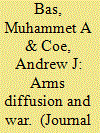

|
|
|
|
|
| Publication |
2012.
|
| Summary/Abstract |
The authors present a model of the relationship between the spread of new military technologies and the occurrence of war. A new technology could shift the balance of power, causing anticipatory war as one side tries to prevent the other from obtaining it. When one side already has it, war is more likely when the shift in power is large, likely, and durable. When neither side has it, war is more likely when the expected shift is asymmetric (e.g., one side is more likely to get it) and when the two sides fear that a war will occur once one of them has it. The authors illustrate the model with historical examples from the spread of firearms (the Musket Wars in precolonial New Zealand) and of nuclear weapons (the end of US nuclear monopoly and the 1967 Six-Day War). A broader implication is that major power competition can unintentionally cause wars elsewhere.
|
|
|
|
|
|
|
|
|
|
|
|
|
|
|
|
| 2 |
ID:
115202
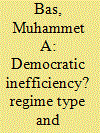

|
|
|
|
|
| Publication |
2012.
|
| Summary/Abstract |
This article examines the relationship between regime type and decision makers' tendency to make suboptimal choices in international crises. To test hypotheses on the optimality of democratic foreign policy, the author uses a novel statistical measure of suboptimality in foreign policy behavior. This estimator builds on Signorino's statistical strategic models to allow for actor-level variation in deviations from optimal behavior in a strategic setting. An analysis of the international disputes from 1919 to 1999 shows that democratic leaders have a greater tendency to choose policies not optimal for their citizens than do nondemocratic leaders.
|
|
|
|
|
|
|
|
|
|
|
|
|
|
|
|
| 3 |
ID:
149127
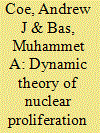

|
|
|
|
|
| Summary/Abstract |
We develop a formal model of bargaining between two states where one can invest in a program to develop nuclear weapons and the other imperfectly observes its efforts and progress over time. In the absence of a nonproliferation deal, the observing state watches the former's program, waiting until proliferation seems imminent to attack. Chance elements—when the program will make progress and when the other state will discover this—determine outcomes. Surprise proliferation, crises over the suspected progress of a nuclear program, and possibly “mistaken” preventive wars arise endogenously from these chance elements. Consistent with the model's predictions and contrary to previous studies, the empirical evidence shows that the progress of a nuclear program and intelligence estimates of it explain the character and outcomes of most interactions between a proliferant and a potential preventive attacker. Counterintuitively, policies intended to reduce proliferation by delaying nuclear programs or improving monitoring capabilities may instead encourage it.
|
|
|
|
|
|
|
|
|
|
|
|
|
|
|
|
| 4 |
ID:
161432
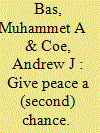

|
|
|
|
|
| Summary/Abstract |
We develop a theory of when a deal can be made to stop a state pursuing nuclear weapons, thereby avoiding proliferation or conflict to prevent it. We show a deal can only be made if costly conflict would occur in its absence. Deals are most likely to be made early, when the state's nuclear program is rudimentary, or late, when it is believed to be nearing success, but not in between. A late deal is credibly enforced by more severe punishment than an early one—immediate conflict rather than merely sanctions—and yet must be more generous to the state. If the state anticipates that a late deal would be offered, it will refuse an early deal in favor of continuing its program to secure the more generous late deal. We test and find support for these predictions against the historical record of deal-making over states’ nuclear programs.
|
|
|
|
|
|
|
|
|
|
|
|
|
|
|
|
| 5 |
ID:
147698


|
|
|
|
|
| Summary/Abstract |
In canonical accounts of war, conflict outcomes are inherently uncertain. Contesting literatures posit that this uncertainty, arising from stochastic elements of the war-fighting process, may induce conflict due to greater risks of miscalculation or foster peace by breeding caution. We theorize that states, on average, exhibit prudence when confronting greater uncertainty. Despite its conceptual importance, extant proxies for uncertainty at various levels of analysis—such as polarity, balance of power, system concentration, and dyadic relative capabilities—are imprecise and theoretically inappropriate indicators. To overcome this shortcoming, we theorize the conditions that elevate the magnitude of uncertainty over conflict outcomes and introduce a novel measure that captures this uncertainty within any k-state system. Through extensive empirical analysis, we confirm uncertainty’s pacifying effect and show how this effect operates at different levels of analysis
|
|
|
|
|
|
|
|
|
|
|
|
|
|
|
|
| 6 |
ID:
157549
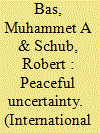

|
|
|
|
|
| Summary/Abstract |
Does a shock to the balance of power cause the advantaged actor to exploit its newfound advantage by initiating conflict? The modeling literature on commitment problems as a source of war makes a central assumption that states know and anticipate power shifts. We relax this assumption such that states must estimate future power shifts by looking at past and present capabilities—both their own and those of their adversaries. We incorporate these estimates, and their attendant uncertainty, into a model of war. We find that commitment problems remain a source of war, but that the existing models overpredict war by ignoring this dynamic. States continuously updating their estimates and accounting for uncertainty promotes peace. It follows that the apparent window of opportunity—in which the power balance becomes suddenly favorable to one side—poses less of a threat to peace than previous theories suggest. This result has applications to nuclear proliferation dynamics and conflict in general. We find empirical support for the model in tests analyzing power shifts and interstate wars.
|
|
|
|
|
|
|
|
|
|
|
|
|
|
|
|
|
|
|
|
|